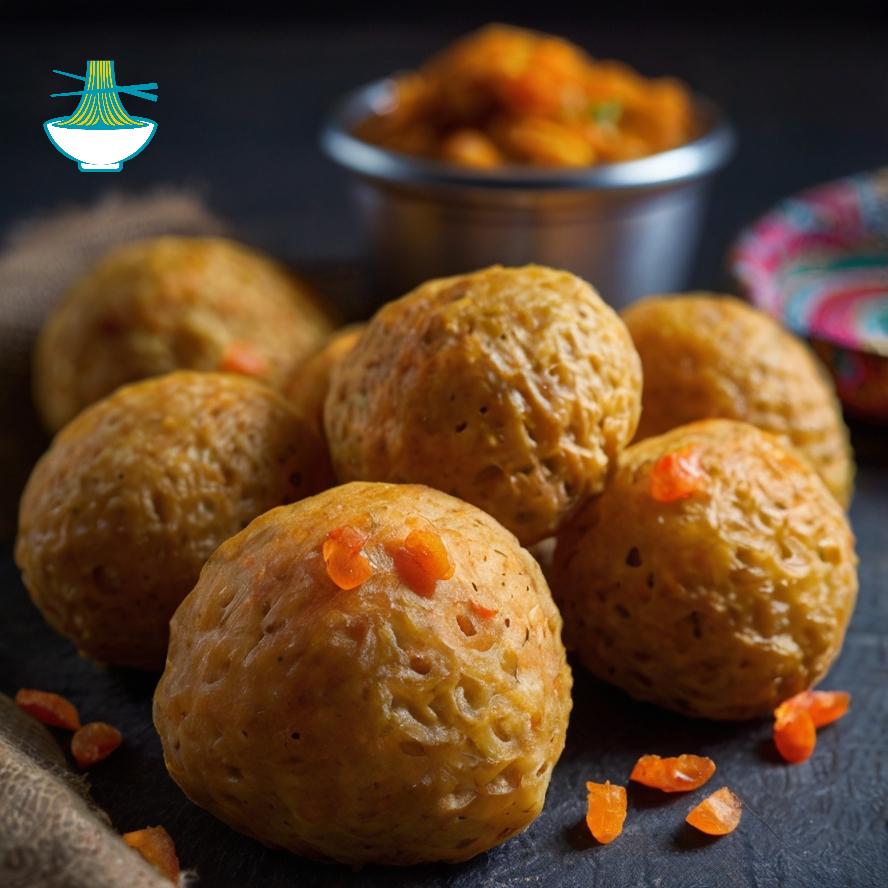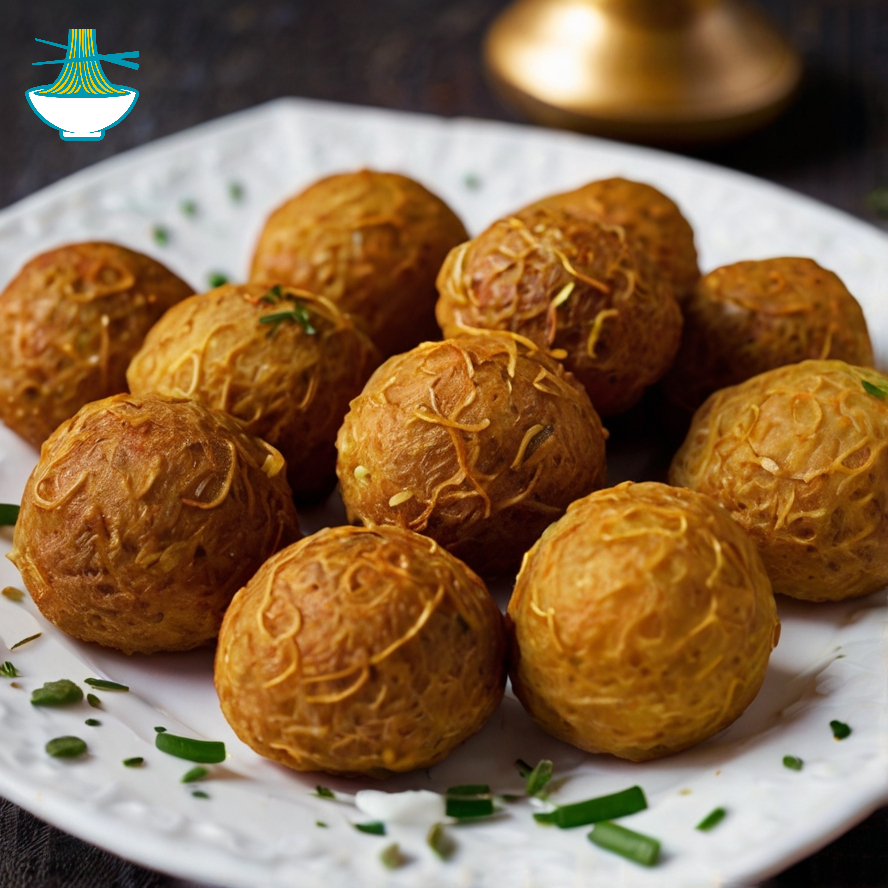Congo Dabo Kolo is a cherished snack in Ethiopia, particularly popular in the western and central regions. This variation of the traditional Ethiopian Dabo Kolo stands out due to its unique blend of spices, including cinnamon and cardamom, which add a delightful hint of sweetness and aroma. Perfect for social gatherings, watching sports, or simply enjoying with family, Congo Dabo Kolo is a crunchy, flavorful treat that's sure to be a hit.

Dabo Kolo has long been a favorite snack across Ethiopia, enjoyed for its simplicity and versatility. The Congo Dabo Kolo variant incorporates regional flavors that give it a distinct twist. While the basic preparation involves deep-frying bite-sized dough pieces, the addition of spices like cinnamon and cardamom reflects the rich culinary heritage of Ethiopia, where spices play a crucial role in flavoring traditional dishes. Often served during festive occasions and gatherings, Congo Dabo Kolo embodies the communal spirit and hospitality of Ethiopian culture.
Ingredients:
- 2 cups all-purpose flour
- 1/4 cup vegetable oil
- 1/4 cup sugar
- 1/4 cup warm water
- 1 teaspoon yeast
- 1 teaspoon baking powder
- 1 teaspoon salt
- 1 teaspoon ground cinnamon
- 1 teaspoon ground cardamom
- Oil for deep frying
Instructions:
1. In a large mixing bowl, combine flour, sugar, yeast, baking powder, salt, cinnamon, and cardamom. Mix well to ensure even distribution.
2. Add vegetable oil to the dry ingredients and mix until you achieve a crumbly texture.
3. Gradually add warm water, mixing continuously, until a firm, pliable dough forms.
4. Knead the dough on a floured surface for about 5 minutes, until smooth and elastic.
5. Divide the dough into small balls, roughly the size of a cherry.
6. Heat oil in a heavy-bottomed pan over medium heat. Once hot, carefully drop in the dough balls and fry until golden brown. Avoid overcrowding the pan to maintain oil temperature and crispiness.
7. Remove the fried dough balls with a slotted spoon and drain on paper towels.
8. Serve warm and enjoy the crunchy, spiced delight of Congo Dabo Kolo.
Tips:
- Use high-quality oil with a high smoke point for deep frying to minimize harmful compounds.
- Store Congo Dabo Kolo in an airtight container for several days for a convenient snack option.
Enjoy the rich, spicy flavors of Ethiopia with Congo Dabo Kolo—an irresistible snack that captures the essence of traditional Ethiopian cuisine.

Nutrition Value:
1. All-Purpose Flour (2 cups)
- Calories: Approximately 910 kcal
- Carbohydrates: About 190 grams
- Protein: Roughly 25 grams
- Fat: Around 2 grams
- Sodium: Minimal, about 2 mg
- Cholesterol: 0 mg
- Vitamins: Contains small amounts of B vitamins, including niacin and riboflavin
- Minerals: Provides iron, calcium, and magnesium
- Nutritional Benefit: All-purpose flour is a staple source of energy due to its high carbohydrate content and provides essential nutrients like iron and B vitamins for overall health.
2. Vegetable Oil (1/4 cup)
- Calories: Approximately 480 kcal
- Carbohydrates: 0 grams
- Protein: 0 grams
- Fat: About 54 grams
- Sodium: Minimal, about 0 mg
- Cholesterol: 0 mg
- Vitamins: Contains vitamin E
- Minerals: Minimal amounts of minerals
- Nutritional Benefit: Vegetable oil is a source of healthy fats, specifically polyunsaturated fats, which are important for heart health. Vitamin E provides antioxidant properties.
3. Sugar (1/4 cup)
- Calories: Approximately 200 kcal
- Carbohydrates: About 50 grams
- Protein: 0 grams
- Fat: 0 grams
- Sodium: Minimal, about 0 mg
- Cholesterol: 0 mg
- Vitamins: Does not provide significant vitamins
- Minerals: Does not provide significant minerals
- Nutritional Benefit: Sugar adds sweetness and energy. However, it should be consumed in moderation as it provides empty calories without essential nutrients.
4. Warm Water (1/4 cup)
- Calories: 0 kcal
- Carbohydrates: 0 grams
- Protein: 0 grams
- Fat: 0 grams
- Sodium: 0 mg
- Cholesterol: 0 mg
- Vitamins: Does not provide vitamins
- Minerals: Does not provide significant minerals
- Nutritional Benefit: Water is essential for hydration and supports all bodily functions. It does not contribute calories or nutrients but is crucial for mixing and activating ingredients.
5. Yeast (1 teaspoon)
- Calories: Approximately 6 kcal
- Carbohydrates: About 1.5 grams
- Protein: Around 0.7 grams
- Fat: 0 grams
- Sodium: About 2 mg
- Cholesterol: 0 mg
- Vitamins: Contains B vitamins, including B1, B2, and B6
- Minerals: Provides trace amounts of iron, calcium, and magnesium
- Nutritional Benefit: Yeast aids in fermentation and adds a small amount of B vitamins, which are important for energy metabolism and overall health.
6. Baking Powder (1 teaspoon)
- Calories: Approximately 2 kcal
- Carbohydrates: About 0.5 grams
- Protein: 0 grams
- Fat: 0 grams
- Sodium: Around 488 mg
- Cholesterol: 0 mg
- Vitamins: Does not provide significant vitamins
- Minerals: Contains sodium
- Nutritional Benefit: Baking powder is used as a leavening agent. It does not provide significant nutrients but helps in the texture and rise of baked goods.
7. Salt (1 teaspoon)
- Calories: 0 kcal
- Carbohydrates: 0 grams
- Protein: 0 grams
- Fat: 0 grams
- Sodium: About 2,300 mg
- Cholesterol: 0 mg
- Vitamins: Does not provide significant vitamins
- Minerals: Provides sodium
- Nutritional Benefit: Salt enhances flavor and is essential for maintaining fluid balance and nerve function. Excessive intake should be monitored to avoid health issues.
8. Ground Cinnamon (1 teaspoon)
- Calories: Approximately 6 kcal
- Carbohydrates: About 2 grams
- Protein: 0 grams
- Fat: 0 grams
- Sodium: Minimal, about 1 mg
- Cholesterol: 0 mg
- Vitamins: Contains small amounts of vitamin K
- Minerals: Provides manganese, calcium, and iron
- Nutritional Benefit: Cinnamon adds flavor and has antioxidant properties. It may support metabolic health and has potential anti-inflammatory effects.
9. Ground Cardamom (1 teaspoon)
- Calories: Approximately 6 kcal
- Carbohydrates: About 1.5 grams
- Protein: 0 grams
- Fat: 0 grams
- Sodium: Minimal, about 1 mg
- Cholesterol: 0 mg
- Vitamins: Contains small amounts of vitamin C and B vitamins
- Minerals: Provides manganese, iron, and calcium
- Nutritional Benefit: Cardamom adds flavor and has antioxidant and digestive properties. It may support gastrointestinal health and has potential anti-inflammatory benefits.
10. Oil for Deep Frying
- Calories: Varies based on the type of oil used
- Carbohydrates: 0 grams
- Protein: 0 grams
- Fat: High content, depending on the oil
- Sodium: Minimal, depending on the oil
- Cholesterol: Depends on the type of oil
- Vitamins: Contains vitamin E in some oils
- Minerals: Minimal amounts of minerals
- Nutritional Benefit: Oil for deep frying is used for cooking and adds a crispy texture. The nutritional impact depends on the type of oil and its fat content.


Comments